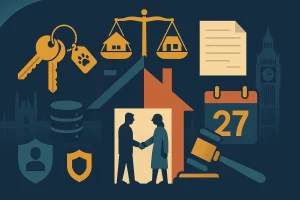Are eviction notices public records in the UK?
In the UK, eviction notices are generally not considered public records in the same way as some other legal documents, such as property ownership records or court judgments. However, certain information related to evictions may become public through legal proceedings or if it is recorded in court documents.
For example, if a landlord initiates legal proceedings to evict a tenant, details of the case may become part of the public record if the case goes to court. This could include information such as the reason for eviction, court dates, and the outcome of the case.
Additionally, some eviction notices may be recorded on a tenant’s credit report if the landlord reports the eviction to credit agencies. However, this information would not typically be accessible to the general public without the tenant’s consent.
It’s important to note that laws and regulations regarding eviction records may vary by jurisdiction within the UK, so it’s advisable to consult legal experts or relevant authorities for specific information.
Can an eviction notice be sent by email?
In the UK, eviction notices can be served in various ways, including by post, in person, or electronically, depending on the circumstances and the type of tenancy agreement in place.
For Assured Shorthold Tenancies (ASTs), which are the most common form of private residential tenancy in the UK, the landlord can serve a Section 21 or Section 8 notice to initiate the eviction process. Section 21 notices, which are commonly used for “no-fault” evictions, can typically be served by post or electronically, such as by email. However, there are specific requirements regarding how these notices must be served, including providing the tenant with a minimum notice period.
It’s important to note that serving eviction notices electronically, including by email, may require proof of delivery to ensure that the tenant has received the notice. Landlords should keep records of any electronic communications related to eviction notices to demonstrate compliance with legal requirements.
For specific guidance on serving eviction notices in the UK, landlords should consult with a qualified legal professional (like us!) or a housing advisor familiar with the relevant regulations and procedures in their jurisdiction.
How long does an eviction process take?
The duration of the eviction process in the UK can vary depending on several factors, including the type of tenancy, the grounds for eviction, and whether the tenant contests the eviction.
For Assured Shorthold Tenancies (ASTs), which are the most common form of private residential tenancy in the UK, the eviction process typically involves serving either a Section 21 or Section 8 notice to the tenant. Here’s a general overview of the timelines involved:
- Notice Period: The length of the notice period depends on the type of notice served:
- Section 21 notice: Requires a minimum notice period of at least 2 months.
- Section 8 notice: The notice period varies depending on the grounds for eviction, but it can range from 2 weeks to 2 months.
- Court Proceedings: If the tenant does not vacate the property by the end of the notice period and the landlord wishes to proceed with eviction, they may need to apply to the court for a possession order. The time it takes to schedule a court hearing and obtain a possession order can vary, but it generally takes several weeks to a few months.
- Possession Order: If the court grants a possession order, it typically specifies a date by which the tenant must vacate the property. If the tenant does not leave by this date, the landlord may need to apply for a warrant of possession to have the tenant forcibly removed by bailiffs.
Overall, the entire eviction process from serving the initial notice to obtaining possession of the property can take several months, depending on various factors such as court backlogs, tenant defenses, and the efficiency of the legal process. It’s important for landlords to follow the correct procedures and seek legal advice if they encounter any challenges during the eviction process.


